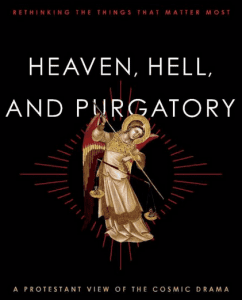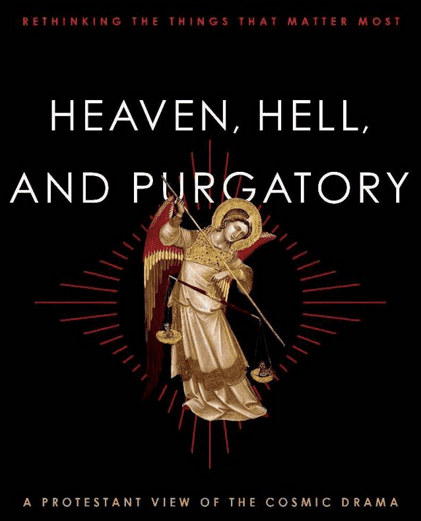 That’s right, C.S. Lewis seemed to have embraced a view Jerry Walls can accurately call “mere purgatory.” (See Purgatory: The Logic of Total Transformation) For many the logic looks like this: If C.S. Lewis believed it, and if C.S. Lewis is “mere” evangelicalism, then it is justifiable to believe in purgatory. Make no mistake about this logic: many evangelicals have courage to believe things unacceptable to their peers and congregations because they know Lewis believed something similar.
That’s right, C.S. Lewis seemed to have embraced a view Jerry Walls can accurately call “mere purgatory.” (See Purgatory: The Logic of Total Transformation) For many the logic looks like this: If C.S. Lewis believed it, and if C.S. Lewis is “mere” evangelicalism, then it is justifiable to believe in purgatory. Make no mistake about this logic: many evangelicals have courage to believe things unacceptable to their peers and congregations because they know Lewis believed something similar.
One more time: Do you believe in purgatory? Do you think transformation will be instantaneous or gradual? Is moral (total) transformation required to participate in God’s heaven?
Lewis, of course, was no saint. And neither was he a proper evangelical as we have come to know that term. Not long ago I was with a man who went to University with Lewis, and that man said to me, “We are all surprised that it is C.S. Lewis who has become the darling of evangelicals.” [By the way, those who have read Bonhoeffer’s Ethics or his Letters and Papers from Prison often say the same of Bonhoeffer.]
C.S. Lewis, for instance, prayed for the dead (found in his Letters to Malcolm: Chiefly on Prayer). The standard view is that the dead are sealed — either glorified or damned. Praying for the dead at least implies something can happen to the dead that could change their status, and so his imagined questioner asks if he is bringing in the idea of Purgatory. Here are the words of C.S. Lewis (Walls has this quote; I am copying this from Letters to Malcolm, p. 108):
Well, I suppose I am. Though even in Heaven some perpetual increase of beatitude, reached by a continually more self-surrender, without the possibility of failure but not perhaps without its own ardours and exertions — for delight also has its severities and steep ascents, as loves know — might be supposed. But I won’t press, or guess, that side for the moment. I believe in Purgatory.
Straight from Lewis’ own mouth: he believed in Purgatory. I have no compulsion to say that because Lewis believed it, it is either OK or evangelical. But it is a bit of an instinct for many of us who think Lewis tapped into the core of the Christian faith in his Mere Christianity to give the man a cupped ear, if not at least a nod.
Walls then sketches how Lewis talked about his deceased wife, Joy, in A Grief Observed, and how he connected her to purgatorial sufferings and cleansings. The view was held by Tolkien, Charles Williams, and Dorothy Sayers. Walls makes a case for seeing Lewis’ purgatory flowing naturally from Lewis’ theology. That is, purgatory is not incidental or casual for Lewis.
Lewis, truth be told, was not evangelical in his atonement theory either. We are in a big hole because we are rebels, and to get out we have to lay down our arms — this is what he means by repentance. But we can’t perfectly repent so, in an Anselmian kind of logic, sees Christ as the perfect penitent (I argued this a bit in Jesus Creed in the chapter on John’s baptism). He substitutes for us in that he surrenders perfectly to God. (Walls observes that Lewis wasn’t into a justification worldview.)
Walls quotes from Lewis, the famous one about there being many people in the world who are slowly becoming non-Christians, and some of them are clergymen; there are also many who are slowly becoming Christians, though they don’t know it. In this Lewis is being a virtue ethicist where character is what makes us fit for heaven: that is, we will find ourselves at home in heaven or find ourselves unable to stomach the place. And a higher level of faith, for Lewis, was when the person, well down the road in his or her journey, comes to the disposition that we are unable and that the person trusts Christ to do it all for them. That is, the person becomes Christlike.
And Christ will finish the job. What complicates it is our freedom. We can push Christ away. But the job will not be — cannot be — completed in this life. Which means it is completed postmortem. Lewis does not teach imputation of Christ’s righteousness; but gracious transformation into Christlikeness. Salvation, for Lewis, was participation in the dance of the Trinity.
Purgatory then is natural to Lewis because salvation is about total transformation, and it requires human reception. It will be finished, that’s a given; but when is the issue. For Lewis, since it isn’t finished here, it will be finished there. Ergo, purgatory is an entailment of salvation as transformation.
For Lewis, purgatory is about sanctification/purification (not retribution); it entails the pain of growth into the deeper reality of joy; and Lewis never minimizes human freedom. But it is the work of God: hence, Walls insists this view of purgatory is very much a matter of grace.
OK, time for me to state where I am:
1. Method is of colossal significance here: there is no biblical warrant for purgatory.
2. Walls, in my view, has made a case for a view of purgatory that is compatible with genuine Protestant thinking, though I cannot imagine the monergist or Calvinist would believe in his view of purgatory. But Walls argues the satisfaction models of purgatory are contradictory to Protestant thinking but the sanctification models are not.
3. I believe those who are committed to virtue ethics ought to believe in purgatory.
4. Walls is right in pushing this discussion into human freedom: if perfection is required, and if perfection for the saint is a matter of growth into perfection because it requires freedom, then purgatory is a reasonable (even Protestant) entailment. Which takes me back to #1 above. How do we frame these sorts of doctrines? What warrants do Scriptures provide?










